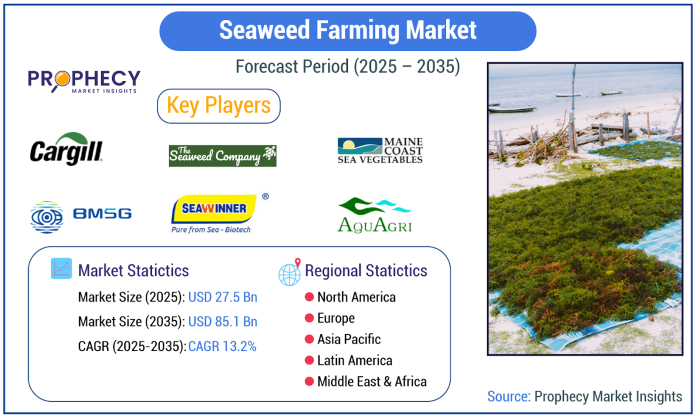Growing and harvesting seaweed is known as seaweed farming or kelp farming. At one extreme, farmers have complete control over the crop’s life cycle, while in its most basic form, they harvest from natural beds. Backing from the government towards sustainable practices that includes advances in seaweed cultivation have contributed to increasing diversity in the seaweed farming market. This, together with an increase in public demand for seaweed as food, in health supplements, or to help fulfill a number of new applications, has transformed the landscape.
Key Growth Drivers and Opportunities
Important Contribution to the Climate Mysteries: Seaweed farming has been praised as a practical solution to the environmental problem by rapidly absorbing carbon and offering a sustainable alternative to carbon-intensive crops and products. It could reduce the carbon emissions from the global food chain, keep carbon out of the atmosphere, and help coastal communities adapt to the impacts of climate change.
Challenges
The seaweed industry is limited but has growing opportunities. Some of the prominent limitations of the seaweed industry include the lack of developed infrastructure for large-scale farming, the vulnerability of quality and yield variation under environmental dependencies, local and regional limitations in ordinance and regulations, the limited range of processed use, the limited consumer awareness outside traditional consumption, a lack of processing technology standards, and logistical challenges that impact harvesting and storage. Together these limitations may impact the scaling, investment interest, and global market development of the seaweed market
Innovation and Expansion
Amrita University Plants the Seeds of the Sea: Empowering Coastal Farmers with Seaweed Tech
In March 2025, the initiative, which is led by the Center for Women Empowerment and Gender Equality (CWEGE) and Ammachi Labs, intends to redefine the role of women in sustainable lifestyles and marine conservation, establishing them as important forces behind economic independence and climatic resilience.
Women from five villages in the Ramanathapuram district Sambai, Olaikuda, Thirupalikudi, Thondi, and Soliyakudi were given farming equipment as part of this trip. Under the Seaweed Cultivation Training Project, which was started in 2023, this program gives women the knowledge, resources, and access to markets they need to start environmentally responsible maritime businesses.
Ocean’s Answer to Climate Change: Seaweed Farming Anchors Carbon Hope
In January 2025, under the direction of Chief Scientist Professor Carlos Duarte and President Alexandra Cousteau, Oceans 2050 has released groundbreaking research that shows that seaweed farming has a substantial potential to mitigate climate change. These findings were published in Nature Climate Change. The study was the first thorough, empirical evaluation of carbon burial rates beneath seaweed farms worldwide and is titled “Carbon burial in sediments below seaweed farms matches that of Blue Carbon habitats.”
This study emphasizes how seaweed farming may help achieve both economic development and food security objectives while also promoting efforts to mitigate climate change.
From Deep Sea to Energy Grid: U.S. Pushes for Ocean Tech Leadership and Market Expansion
In January 2025, A USD 25 million initiative has been started by the U.S. Department of Energy (DOE) to cultivate seaweed in deep oceans for the production of industrial goods and energy. The effort, known as the Harnessing Autonomy for Energy Joint Ventures Offshore (HAEJO) program, would establish a large-scale seaweed farming sector by utilizing the United States’ vast ocean domain, which is the biggest in the world.
The initiative is to diversify U.S. energy biomass production sources in U.S. seas, promote marine industries, and increase deep-water seaweed cultivation by collaborating with South Korea, which has seaweed farming experience.
Inventive Sparks, Expanding Markets
In the seaweed farming market, businesses include Cargill, Incorporated, ASL, Qingdao bright moon seaweed group co., LTD., The Seaweed Company, AQUAGRI PROCESSING PRIVATE LIMITED, and others. To be successful in the seaweed farming business, companies must include value-added processing, innovate in cultivation, promote sustainable habits, develop partnerships, and create market access due to growing demands and applications for seaweed products.
About Author:
Prophecy is a specialized market research, analytics, marketing and business strategy, and solutions company that offer strategic and tactical support to clients for making well-informed business decisions and to identify and achieve high value opportunities in the target business area. Also, we help our client to address business challenges and provide best possible solutions to overcome them and transform their business.


